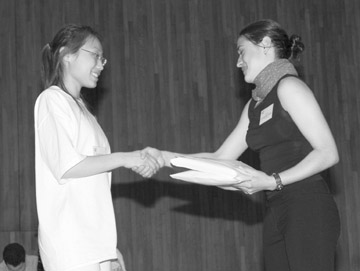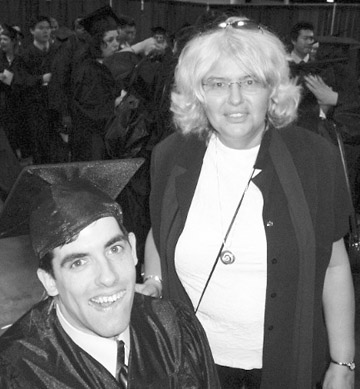Van Der Meer Cleared: After Ten Months, All Charges Dropped

UMass professor Tony Van Der Meer thanks members of the support committee who organized to pressure the District Attorney to drop all charges against him. – Photo by Tony Naro
February 26, 2004
Friends and supporters celebrated with UMB Africana Studies professor Anthony Van Der Meer. All charges against Van Der Meer were dropped as of Tuesday, February 19. Arrested 10 months ago in a fracas involving campus police and two National Guard recruiters, the professor was wrestled to the ground and charged with resisting arrest and assaulting an officer after stepping between the two recruiters and a group of angry students.
Last April 3, 2003, several students were protesting the presence of the two recruiters on the second floor of the McCormack building when Van Der Meer arrived and became involved in an altercation with the guardsmen.
In what Van Der Meer described as “insanity,” he was allegedly assaulted by one of the recruiters, and then knocked down and arrested by campus police, who were standing nearby.
According to witnesses, as the students and National Guardsmen shouted at each other, one of the guardsmen told a student that “he should be shot in the head,” and Van Der Meer stepped between them. The guardsman allegedly poked Van Der Meer in the chest and then campus police moved in, and after an exchange of shoves, pushed Van Der Meer to the floor, tearing his jacket.
A small crowd of shocked students followed the police and Van Der Meer when he was taken into custody and brought to the Public Safety Office. As word spread of the arrest the crowd outside the office swelled to several dozen, and many followed Van Der Meer to Dorchester District Court where he was arraigned and released on charges of resisting arrest and assaulting a police officer.
Calling the incident an “embarrassment” to the campus police, Van Der Meer said, “To push a professor when he’s been poked, assaulted by the National Guard is completely insane.
“For the National Guard to come on this campus and tell a student they should be shot in the head like Martin Luther King, for the university to do nothing, that is outrageous.”
Now that his case is officially no more, Van Der Meer plans to file civil charges against the officers who arrested him, and hopes to draw attention to his arrest.
The celebration took place at the Cultural Caf in Jamaica Plain over food and drink. Tony Naro, the student who began the protest against the National Guard recruiters and was involved in helping Van Der Meer after his arrest, said that the gathering was “low-key,” and included members of advocate groups, such as the Support Committee for Tony Van Der Meer, along with family, friends and students.
“Tony got up and thanked everybody for their time and effort” said Naro, and people talked about how “Tony’s struggle was connected with the struggle of a lot of other people.”
The partygoers also laid plans for the upcoming “Moment of Silence” campaign, which calls for a moment of silence in remembrance of the assassination of Martin Luther King on April 5, a program with which Van Der Meer was involved last year.
Following his arrest in April, Van Der Meer went through what he describes as a “ten-month ordeal” in the court system, which included errors by his attorneys and shifting trial dates.
Van Der Meer obtained counsel through a volunteer from the National Lawyer’s Guild but the attorney apparently botched a request to reschedule the trial, which resulted in the issuing of a warrant for Van Der Meer’s arrest for failure to appear. “Horrified” to learn of the warrant, he appeared the same day to clear up the confusion. He subsequently retained a lawyer who successfully navigated the rest of the court appearances with the help of the Massachusetts Teachers Association and campus unions.
“Elizabeth Mock, president of the union, was very helpful,” he said.
At the time of Van Der Meer’s arrest, Mock released a statement on behalf of the Faculty Staff Union that demanded all charges be dropped against him and that the university “put the campus police on notice that racist actions will not be tolerated (in accordance with its policies regarding a ‘civil’ campus atmosphere) and that there be mandatory anti-racist training of all campus police officers.”
In response to the incident, Chancellor Jo Ann Gora put together the Campus Safety Advisory Board, which first met in September 2003, five months after Van Der Meer’s arrest.
Despite conciliatory efforts by the advisory board, Van Der Meer feels that the university hasn’t done enough to address his case.
“The university really needs to figure out how to handle this. To let it go would be a huge mistake.
“I would have liked to see the university be more forthcoming about this. They should have taken action against the campus police and they should have acted to get the case dismissed.”
Van Der Meer says the he received support from all over, but got the most help from UMB students, “They went from beginning to end with this.”
He also received international support thanks to media attention to his case, saying he heard from “friends in Cuba, friends in Africa, friends in Canada who spread the word, saying they would pray on this,” and he received calls and e-mails on a daily basis.
Van Der Meer says that the experience has left a mark on the way he sees his experience at UMass Boston “It has affected me professionally.
“For a professor to be humiliated and embarrassed and tackled is not good memories. It has definitely left a stain.”
He says that the most positive thing about his arrest was that “people got outraged.”























































